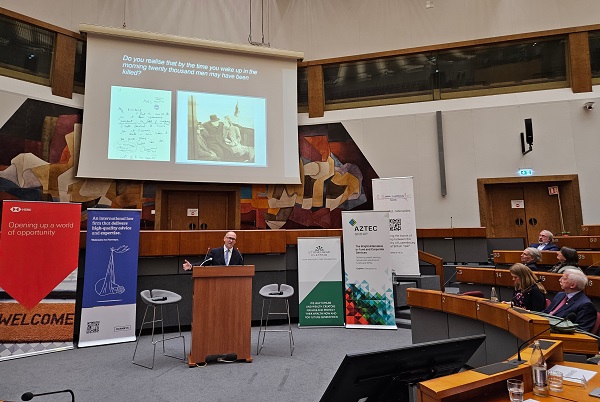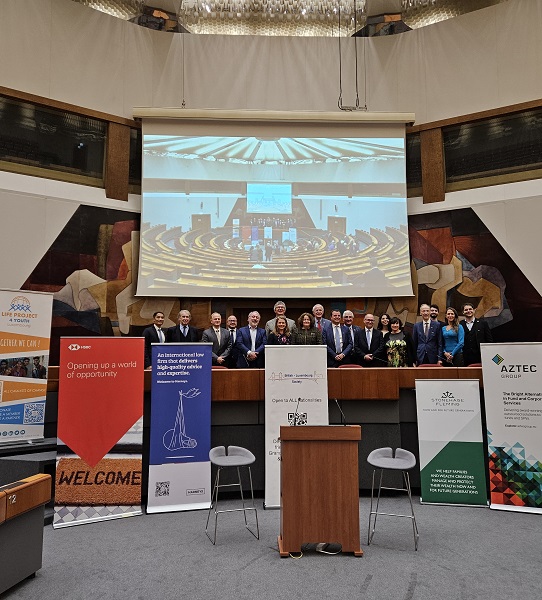 Allen Packwood;
Credit: Jazmin Campbell/Chronicle.lu
Allen Packwood;
Credit: Jazmin Campbell/Chronicle.lu
The British-Luxembourg Society (BLS) and its Patrons and Council, together with the British Embassy in Luxembourg and the Fondation Nationale de la Résistance, held their annual Sir Winston Churchill Memorial Lecture at the Hémicycle in Luxembourg-Kirchberg on Tuesday 15 October 2024.
About 200 people attended this prestigious evening event, which saw guest speaker Allen Packwood, Fellow of Churchill College, Cambridge, and Director of the Churchill Archives Centre, deliver a lecture on Churchill and his role in the D-Day landings of 6 June 1944.
Interview with Allen Packwood
Churchill Archives Centre
Allen Packwood began working as an archivist at the Churchill Archives Centre in 1995, before taking over as its director in 2002. Speaking to Chronicle.lu ahead of the BLS lecture, he explained the origins and mission of the centre which strives to be a place "where the modern history of Britain is open to all". Churchill College, which houses the centre, was founded in 1960 as the National and Commonwealth Memorial to Sir Winston Churchill. The college opened a library and began collecting papers in 1965; four years later, Churchill's widow, Clementine, donated her husband's post-1945 papers to what would become a dedicated archives centre.
The Churchill Papers grew into a "huge collection", comprising more than 2,500 boxes and about one million documents, and "opened the floodgates" to other collections. The centre holds the papers of some 600 individuals, including five past BLS Winston Churchill Memorial Lecture guest speakers, namely: Sir Christopher Soames (1977 speaker); Baroness Margaret Thatcher (1979 speaker); Lord Peter Carrington (1981 and 1990); Sir Leon Brittan (1993); Lord Neil Kinnock (2004). "The idea is to build up under one roof an integrated archive study of Britain in the modern world," Allen said, adding that anyone can make an appointment at the centre and/or access its online resources.
"Churchill's D-Day: The Tyranny of Overlord"
Turning to the topic of his lecture on Tuesday evening, Allen Packwood shared how he co-wrote a book on this subject - Churchill's D-Day: The Inside Story - together with the former head of the British Army, Lord Richard Dannatt, to mark both the 80th anniversary of D-Day and the 150th anniversary of Churchill's birth this year. Another motivation behind this book and the BLS lecture topic was Allen's belief that Churchill's role in D-Day (or "Operation Overlord") has often been either overlooked (people often think of the Americans' role) or portrayed negatively and unfairly (for example in the 2017 film Churchill).
Allen noted the importance of "strip[ping] away the layers of hindsight" - we know today that D-Day was a success, but could it have happened earlier? Allen argues that there were "very good reasons" why it could only have happened in 1944. He cited Britain's weak position earlier on in the Second World War, how it had to wait for the arrival of its new allies (the US and the Soviet Union) and, even then, it took time to build up and test their trust and teamwork, as well as to develop the necessary equipment and train crews. There were certain preconditions that thus needed to be met.
Allen also spoke about the civilian side of Churchill's role, which is "often overlooked but equally essential" in the success of D-Day. Unlike the military leaders, he had to consider the post-war situation and the political ramifications of certain decisions - for example, the impact of high civilian casualties in France during Allied bombing. He was also thinking about the future of the British Empire. D-Day was thus an "all-consuming operation"; it was also a "make-or-break operation" - there was no Plan B. However, Churchill was not the only one who was worried or hesitant about this major military operation and, again, leaders at the time did not have the "luxury of hindsight". The "magic of archives", according to Allen, is that they "plunge us back into the moment". Whilst he acknowledged they are "inevitably impartial", not giving us the whole truth, they can "capture the essence [...] and the emotion" of the time, as well as revealing what people did not know back then.
Asked whether those who fail to learn from history are doomed to repeat it, Allen Packwood replied: "History doesn't repeat itself". He said he is often asked "What would Churchill do?" in terms of current geopolitical developments, but it would be "impossible" to answer this, due to the "very different time context" in which we operate. In addition, it was already difficult to predict Churchill's actions in his own time. However, he did apply "certain firm principles", for example he believed it was important that Britain "stands shoulder to shoulder" with the US; Allen noted Churchill also wanted the "best of both" worlds, i.e. one foot in Europe, the other in the US. He would have also supported negotiation but only from a position of strength, and he valued his allies and would have backed NATO.
BLS Lecture
Allen Packwood's informative and engaging lecture was preceded by the opening remarks of BLS Vice-President Louise Benjamin, who explained how the BLS was founded in 1947 (one year after Churchill's well-received visit to Luxembourg) to bring British people and culture closer to the Luxembourgish people. Albert Hansen then presented the main objectives of the Fondation Nationale de la Résistance, notably to preserve the collective memory of the Second World War and Luxembourg's resistance. Next up was Fleur Thomas, British Ambassador to Luxembourg, who thanked the BLS for having worked "tirelessly" to strengthen UK-Luxembourg relations, and noted that there were many reminders of Churchill all around us, even in Luxembourg where his 1946 visit "cemented" the two countries' friendship for years to come. She added that we are "reminded today of the vital lessons history offers", namely the need to stand together in the face of challenges and protect our hard-won peace and freedom.
Allen's speech, which elaborated on the issues discussed above, was followed by many questions from an enthusiastic audience.
The evening concluded with a networking cocktail downstairs in the Hémicycle.









